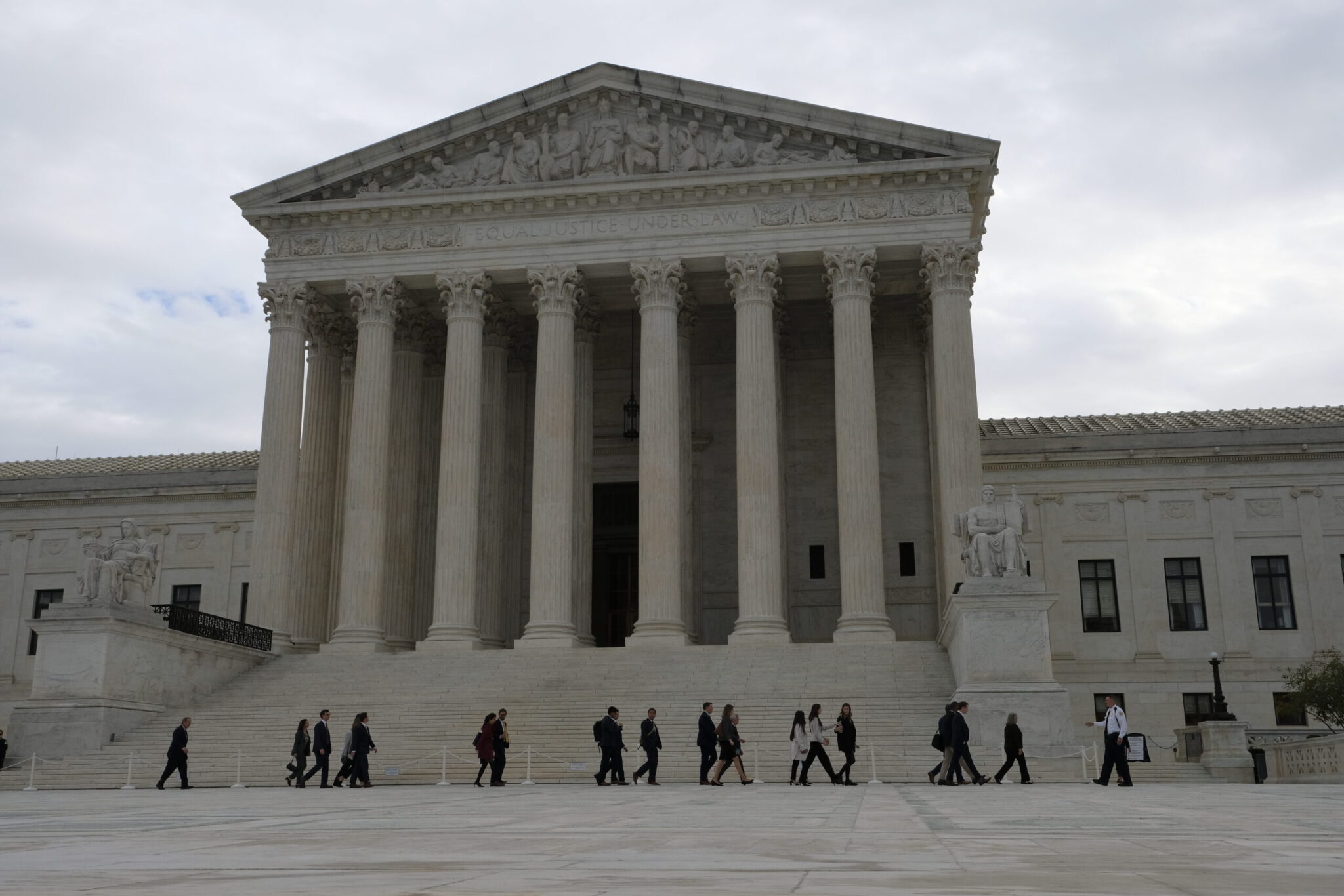Yale Law experts preview cases in upcoming Supreme Court term
Yale Law School professors Bill Eskridge LAW ’78, Linda Greenhouse LAW ’78 and Sam Moyn discussed the significance of the Supreme Court’s upcoming term on Monday.

Rachel Shin, Contributing Photographer
Yale Law School students gathered in the Sterling Law Building on Monday afternoon to attend a panel discussion centered around the Supreme Court’s upcoming term.
The event, hosted by progressive legal organization the American Constitution Society, featured Yale Law professors Bill Eskridge LAW ’78, Linda Greenhouse LAW ’78 and Sam Moyn as the panelists. At the talk, the experts delved into an array of topics, ranging from what they predict will be the most impactful forthcoming cases to a discussion on the Court’s politicization. Each attendee received a flier detailing all the cases that the panelists discussed during the conversation.
“At YLS, we’re lucky to have access to brilliant legal scholars who can offer sharp, nuanced analyses of cases that will be argued before the Supreme Court,” Rosemary Coskrey LAW ’25, co-president of the ACS, wrote to the News. “ACS organizes a Supreme Court term preview each year to familiarize students with evolving doctrines and highlight the stakes of upcoming cases.”
Coskrey also told the News that the preview most gives students an opportunity to think critically about the Court’s decisions and to imagine the role students play in “shaping a more progressive, equitable constitutional jurisprudence.”
At the event, each professor focused on a different aspect of the Court’s upcoming term.
Eskridge, whose primary legal academic interests have been statutory interpretation, highlighted some of the cases that, in his opinion, could be the most consequential. Among these cases are those involving social media platforms in Florida and Texas, which the Court will address in Moody v. NetChoice and NetChoice v. Paxton. These cases have the potential to establish new precedents regarding the ability of large social media platforms like X, formerly known as Twitter, and Youtube to remove specific posts, potentially broadening the scope of free speech on those platforms.
Eskridge also discussed a case involving South Carolina’s congressional map, which was invalidated on grounds of alleged racial gerrymandering. He called this case a “sequel to Alabama,” referencing a case in the Supreme Court’s last term in which the justices determined in a narrow 5-4 ruling that Alabama’s congressional map was racially gerrymandered and consequently in violation of the Fourteenth Amendment and the 1965 Voting Rights Act.
Eskridge also highlighted a pending case that the Supreme Court has not yet agreed to hear relating to high school admissions practices. Thomas Jefferson High School for Science and Technology, a state-charted magnet school in Virginia, revised its admissions policies in 2020 to increase the Black and Latine enrollment at the school; however, the efforts resulted in a decrease in the school’s Asian American representation. Coalition for TJ, the group that formed in opposition to the school’s change in admissions policy, is alleging that this process unfairly discriminates against Asian Americans.
“If [the Court] accepts this case, the ruling could be very consequential,” Eskridge said.
Greenhouse, a former Supreme Court reporter for the New York Times, highlighted the upcoming Supreme Court case United States v. Rahimi, which is set to evaluate the Second Amendment rights of individuals under domestic violence restraining orders. She said that the Fifth Circuit’s ruling was “a revolutionary change” for how courts have been instructed to look at Second Amendment cases.
The Fifth Circuit ruled that a law prohibiting individuals with domestic violence restraining orders from possessing firearms is unconstitutional, as they deemed it inconsistent with the Founders’ original intent regarding the Second Amendment. The three-judge panel in their decision contended that the concept of domestic violence, as it is understood today, did not exist when the Constitution was originally drafted.
Greenhouse countered this judgment by claiming that in the historical context, the absence of the concept of domestic violence stemmed from the fact that women had minimal to no rights.
She also raised an argument mentioned in a brief concerning the Court’s prior ruling in Dobbs v. Jackson, which she said might hold weight in United States v. Rahimi. She pointed to the Court’s acknowledgment of, as Greenhouse put it, “the rights of the unborn” against abortion, prompting her to ask the question: “What consideration is given to the rights of women who are victims of domestic violence?”
Moyn focused his section of the talk on the relationship between the Court and the general public.
He said that the Supreme Court pushed back against the gender equality argument presented in Dobbs two years ago and, to a lesser extent, against racial equality in its last term as justices voted to strike down racial affirmative action in college admissions. According to Moyn, this term’s cases seem to be centered around the “continued exacerbation of class inequality.”
Moyn highlighted the upcoming case Moore v. United States, which will decide whether the Sixteenth Amendment allows Congress to tax “unrealized” assets as income. Essentially, he said, this case will clarify what assets Congress has the power to tax.
“[These cases] are all about neoliberalism,” Moyn said. “And what that means is that they’re all about corporate power and wealth inequality indirectly.”
Moyn expressed an interest in observing the rulings of the Court’s conservative justices. He said that he wonders how the three liberal justices will respond to the Court’s conservative majority and what lines they will draw to the majority.
The Supreme Court’s 2023-24 term began on Monday, Oct. 2, the same day as the panel discussion.







